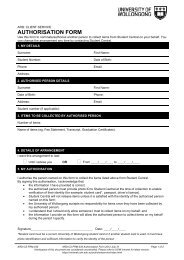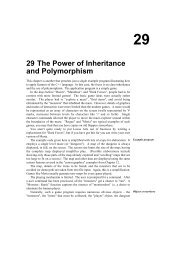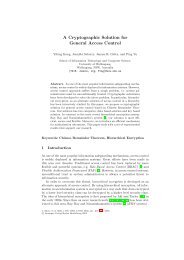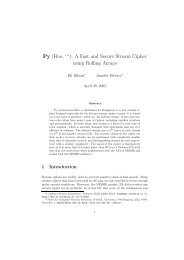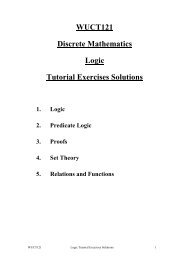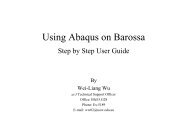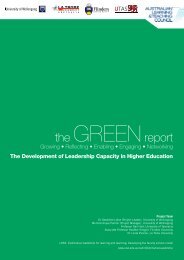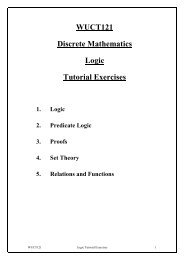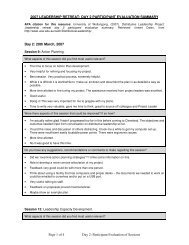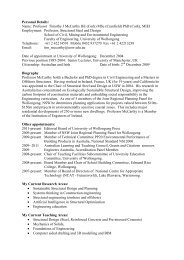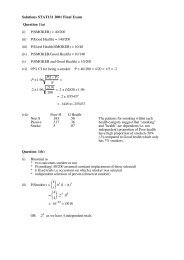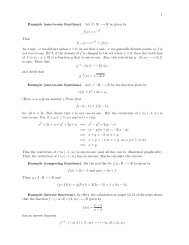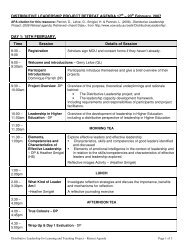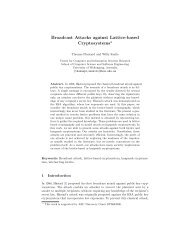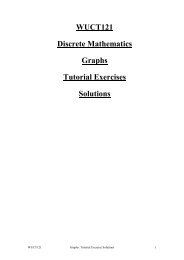india author m 1- a-nan - University of Wollongong
india author m 1- a-nan - University of Wollongong
india author m 1- a-nan - University of Wollongong
You also want an ePaper? Increase the reach of your titles
YUMPU automatically turns print PDFs into web optimized ePapers that Google loves.
NARAVANE, VISHWANATH S. Sarojini Naidu: An Introduction to her Life, Work and<br />
Poetry. New Delhi: Orient Longman, 1981, 160pp.<br />
Naravane begins with "Recollections"; he first met Sarojini Devi (as she was<br />
commonly addressed in public life) in 1938 when he was an undergraduate student at the<br />
<strong>University</strong> <strong>of</strong> Allahabad. A. N. Jha, Vice Chancellor <strong>of</strong> Allahabad <strong>University</strong>, was one <strong>of</strong><br />
Sarojini's earliest editors. Naravane (who rose to be Pr<strong>of</strong>essor <strong>of</strong> Philosophy at the <strong>University</strong><br />
<strong>of</strong> Poona) concentrates on the personality <strong>of</strong> Sarojini. There are chapters on "Background and<br />
Preparation", "Promise and Fulfilment", "Friendships: Gokhale, Gandhi, Nehru", "Vision <strong>of</strong><br />
India", "Sarojini and the Women <strong>of</strong> India", and "Poetry <strong>of</strong> Nature". The "Assessment"<br />
(pp.128-53) presents a balanced evaluation <strong>of</strong> her poetry. Naravane's book is important for<br />
the first hand account <strong>of</strong> an unforgettable personality, whose most precious gift was humour.<br />
He observs that "there was absolutely nothing in common between her humour and her<br />
poetry." Her conversation was very witty, and she was always ready to poke fun at herself<br />
and others. Naravane presents a selection <strong>of</strong> such stories.<br />
Osmania Journal <strong>of</strong> English Studies 16.1 (1980).Special Naidu issue.<br />
GHOSE, SISIRKUMAR. "Sarojini Naidu: Towards a Revaluation":23-36.<br />
MIRZA, TAQI ALI. "The Poetry <strong>of</strong> Sarojini Naidu: An Apology":50-5. [check others]<br />
PRASAD, DEOBRATA. Sarojini Naidu and Her Art <strong>of</strong> Poetry 1988, xvi + 216 pp.<br />
publisher?<br />
PRASAD, DEOBRATA. Sarojini Naidu and Her Art <strong>of</strong> Poetry. Delhi Capital Publishing<br />
House, 1988, 216pp.<br />
Prasad has unreserve praise for Naidu as "a mature artist who can manipulat<br />
language". He considers the poems thematically, with chapters on "Nature's Ecstasy", "Indian<br />
Flavours" (covering poems like "Coromandal Fishers" and "Indian Weavers"), "Patriotic<br />
Urges", "Lyric Bloom", "Colour Values", and "Mystic Urge."<br />
PRASAD, VEENA RANI. "Sarojini Naidu's Lyrical Mode." Indian Writing in English, edited<br />
by Krishna Nandan Sinha (Delhi: Heritage Publishers, 1979): 99-108.<br />
Sarojini Naidu's sensibility is essentially Romantic. She is a lyricist, and many <strong>of</strong> her<br />
poems show her fascination with the beauty <strong>of</strong> nature. Like Emily Dickinson, she has a<br />
partiality for colour and perfume, and flowers, especially the lotus, have a symbolic value for<br />
her. She is good at recreating the rural scene. Prasad compares Sarojini's love poems with<br />
Emily Dickinson's.<br />
RAJYALAKSHMI, P. V. The Lyric Spring. New Delhi: Abhinav Publications, 1977. 221pp.<br />
Based on a doctoral thesis submitted to Andhra <strong>University</strong>. Thematic study, which<br />
attempts to show that Naidu's poetry may be outmoded, but not outdated. Concluding<br />
chapter, "The Sceptred Flute" (pp. 179-221) contains a good survey <strong>of</strong> other critics' views on<br />
the poet. Has a comprehensive bibliography (pp 211-216).<br />
RANGAN, V. "Sarojini Naidu's 'Song <strong>of</strong> Radha, a Milkmaid'." The Literary Endeavour 2,<br />
no.1 (1981): 53-59.A short sloka (Sanskrit verse) by Lilasuka is wrought into a long lyric by<br />
Naidu. Radha's devotion to the lord is in the tradition <strong>of</strong> madhurabhakti. Rangan shows the<br />
influence <strong>of</strong> the azhwars (old Tamil mystic poets) on Naidu's presentation. The three stanzas<br />
<strong>of</strong> Naidu's poems descri Radha at the fair, then going to the river to get water, and finally at<br />
the temple; "fair" and "water" have their symbol value in Srivaishnava philosophy.



